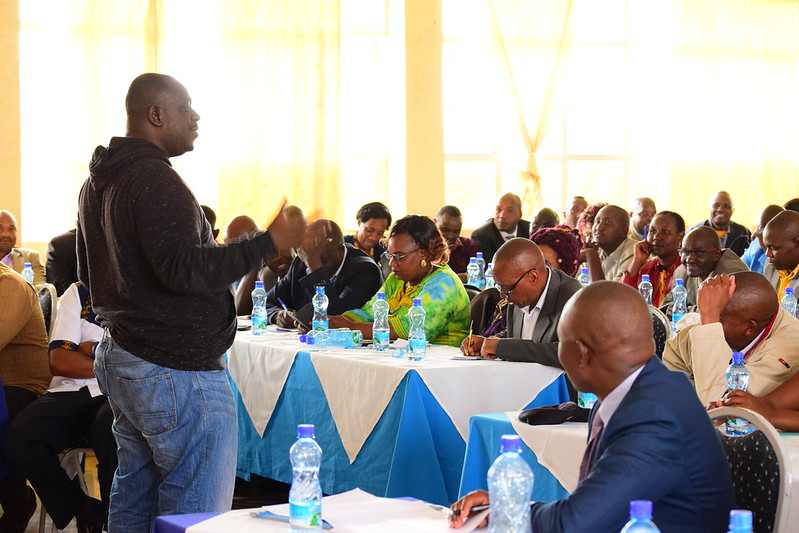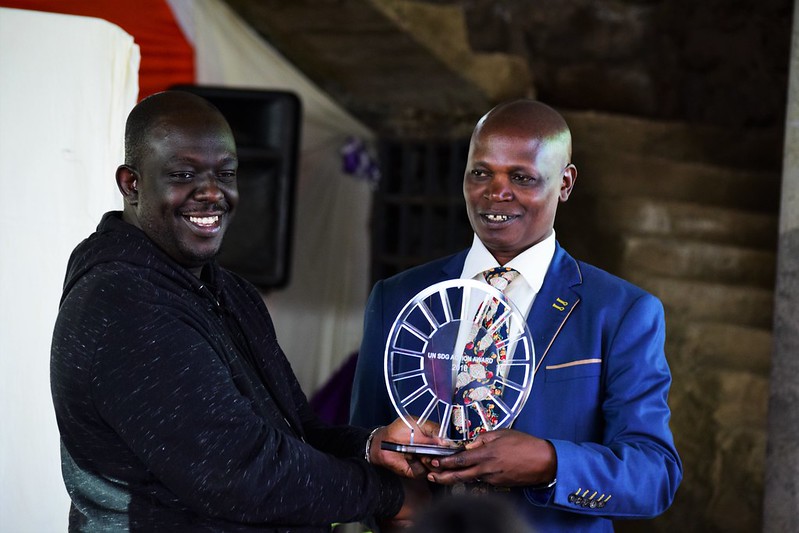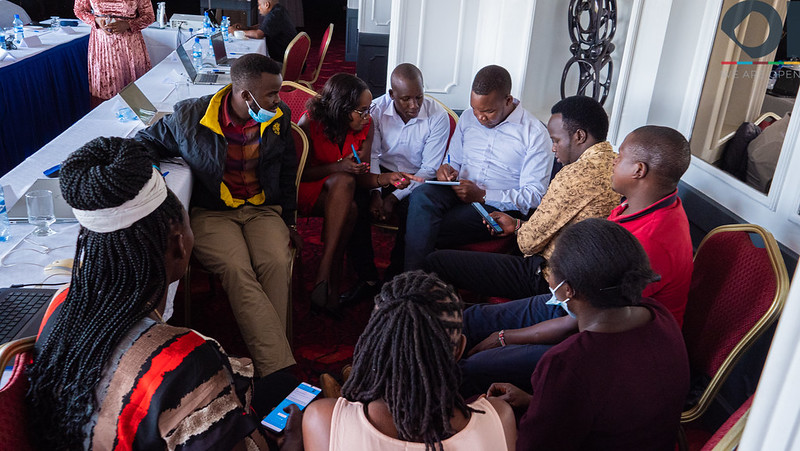This week, we celebrate ten years since our founders started on a journey towards an open society that is managed by informed, fact-driven citizens. Here’s a fun factoid: our original name was going to be lengthy – The African Centre for Open Governance and Open Data (ACOGOD). As we start thinking about things we are grateful for in these past 10 years, a short name – The Open Institute (OI) – is top of the list!
Where we started
When Jay Bhalla and Al Kags started the Open Institute, they were right at the centre of the open data conversation in Kenya. The concept of open data and open government was just picking up speed, and it was during the initial journey into actualizing an open data portal in Kenya that Jay and Al came together as conveners, working together with other players as part of the Kenya Open Data Taskforce.
Their collaboration led to the birth of the Open Institute as a global think/do tank of experts which provided advisory and technical services in the open data and governance space. The Open Institute’s journey started in 2012 with the quest for government transparency. Our argument in those days was that if the government were provided with the (tech) tools, policy framework and skills, then the government would be proactively transparent and publish open data consistently. As users of open data, we also thought that governments would eliminate silos and improve public service delivery in tune with citizen needs. Our argument followed that citizens (through civil society organisations (CSO), academia, media and other “infomediaries”) would then use the data to make representations of their needs and priorities.

Al Kags speaks during the Nakuru chefs orientation in 2018

This general theory guided our hands as we worked with several governments as they embarked on their open data journeys. In partnership with the World Bank, we worked to promote open data in various countries, including Kenya, Ghana, Moldova, Tanzania and South Sudan. In addition, we trained CSOs and journalists in a bid to strengthen their roles as infomediaries so that we could develop demand for the data. We worked with web developers to develop tools that used open data to make it easy for citizens to interact with the data directly. The development of web and mobile tools has remained a big part of our work since then. However, by 2013, we refocused our work to pivot more deeply on subnational government openness. In 2015, we also strengthened our focus on active citizenship, driven by our Global Goals for Local Impact thinking.
We are somewhat in awe of how far the dream has brought us. Over the last ten years, we have immersed ourselves in work that espouses our belief that the goal of open government is engaged, involved and present citizens. We continue to affirm that the best way to get citizens involved is by giving them relevant data in a way that enables them to visualise their world, their way.
As we kick off our second decade, we have taken the time to review our work and experiences over the past 10 years to consider overarching lessons that would direct our choices going forward.
Our Ten Lessons
- Citizens have a voice, and if they witness actual results emanating from using their voices, then they are happy to participate. The converse is also true: if they advocate for change and nothing happens, then they become jaded and apathetic. We have learned that all actors, including civil society, must focus on winning the trust of the citizens. It’s on us to overcome the “Why should I bother?” sentiment and do our part in making active citizens.
- Data initiatives have the greatest impact when everyone is involved – CSOs, private sector government, must come together and work in concert. When technology folks are paired with civil society and community institutions, then they can build apps that are sustainable, useful, and usable. When journalists are brought in, they can be ready to receive and share the feedback from citizens and put decision-makers on the spot. Donors can then get granular data from the citizens themselves on how their projects are doing on the ground, which will help them get more value from their money and could result in more sustainability.
- Communities have different realities, contexts, needs and priorities. Some have a need for better schools, while others need better sanitation. Some communities rely most on agriculture as their main economic activity, while others focus on trade and business. We have learned the importance of taking the time to listen and understand the reality of each community we engage with, and work with them to create solutions that meet their unique needs.
- Whereas a great deal of money has been invested in developing Civic Tech tools that support transparency and accountability or improved public service delivery, it has become apparent over time that citizens do not use the tools in general. Our estimation of why that is led us to several reasons, primarily, the lack of widespread awareness of the tools and a lack of confidence that the usage of the tools would lead to actions that would improve their lives by duty bearers.
- Government transparency succeeds most where citizen engagement is high. For high levels of citizen engagement to be seen, we have learnt that active citizenship is necessary. As we made the promotion of active citizenship a core part of our work, we observed that there are practical barriers to active citizenship that must be dealt with – namely functional literacy and citizen exposure, logistics and the confidence that citizen action can make a difference. An illustration of this is county government officials we have spoken to have repeatedly observed that public participation meetings are usually attended by the same people almost every time. These “soft issues” have been under-invested.
- We are now even more clear that active citizenship generally happens at local and hyperlocal levels. People care more about what aspects of development they touch – the roads they use, the hospital they go to, the school their children go to, whether water runs in their taps and whether electricity is consistent. They review and understand the budgets for those things that they care about. We have learnt that we are more likely to trigger increased interest and action by engaging people at local and hyperlocal levels. To wit, if budget data is published relating to projects in my ward that affect me, I am more likely to be an active citizen. If we can get down to the community and deal with people at their level, we will have a far more significant impact
- Transparency and accountability initiatives have generally focused on developing tools and policies and enacting laws to support transparency while ignoring the so-called “soft issues” – awareness, behaviour change and the social imperatives that support change. For instance, little attention is paid to the emotional obstacles to the sustainability of the initiatives. When we worked with the Kenya government on the Kenya Open Data Initiative, a prevalent fear was articulated by a cabinet minister of that time that open data would lead to scandalisation of government activities. “We will spend all our time defending ourselves in the media.”
- We have observed a frustration by open data practitioners (often including ourselves) that there was limited demand for data, evidenced by the low traffic to data platforms. Some have questioned the value of releasing data where chances are high that it will not be used widely. Over time, we have become more explicit in our position that governments should freely and openly release data and other information promptly, regardless of the level of demand. We acknowledge that this would require a culture change and behaviour change at individual levels.
- To accelerate development and increase the SDG achievement rate, there is an opportunity to build robust support systems for local and hyperlocal citizen engagement. For example, it is easier for one to speak up at a public participation meeting if they feel they have the backing of other community members, and have a firm grasp of relevant information. There is a substantial opportunity for community-based organisations and groups to be harnessed to give power to citizens at the local level to use their voices. Norms are built and shared by “our people”, who we trust and whose opinions we value. Community-Based Organisations and local mobilisers and organisers have the highest chance of developing that trust and esteem in their communities because they are homegrown.
- It is necessary to address the power imbalance in the development space. The challenge here is that the way power is structured in the development space engenders performance (as in theatre) and pandering towards funding sources. We have seen it manifest itself on two fronts. First, we have seen organisations hype up the impact of their work to portray it as successful even when that success is dubious or not there – and we have seen them rewarded with more funding for the hype. Secondly, we have observed smaller organisations frame the problems they try to solve in their communities in the ways dictated to them by their funders. That pandering has yielded a reduction in trust by community members. As a result, they demand payment for participating in development activities that could improve their lives. There is an opportunity to reorganise the design of the programmes to start from the community upwards.
Looking ahead
These valuable lessons have provided us a platform to start to envision what the next decade of work looks like for us. We continue to be committed in advocating for the active involvement of citizens in governance and development. As we look forward to the next few years, our focus largely remains the same: we shall aggressively promote government transparency and active citizenship by providing cutting-edge tools, ideas, knowledge and policy support to everyone that supports this cause.

To all our partners, supporters, observers and friends, we want to thank you for continuing to be a part of our journey.

14 Comments
Comments are closed.